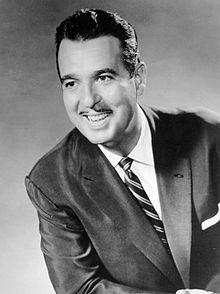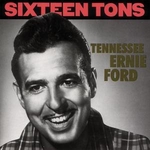Ernest Jennings Ford (February 13, 1919 – October 17, 1991), known professionally as Tennessee Ernie Ford, was an American recording artist and television host who enjoyed success in the country and Western, pop, and gospel musical genres.
Noted for his rich bass-baritone voice and down-home humor, today, he is best remembered for his hit recordings of "The Shotgun Boogie" and "Sixteen Tons".
| Tennessee Ernie Ford | |
|---|---|
 |
|
| Background information | |
| Birth name | Ernest Jennings Ford |
| Born | February 13, 1919 Bristol, Tennessee, United States |
| Died | October 17, 1991 (aged 72) Reston, Virginia, United States |
| Genres | Country & Western, Pop, Gospel |
| Occupation(s) | Singer, actor |
| Instruments | Vocals, Guitar, violin |
Biography
Early years
Born in Bristol, Tennessee to Maud Long and Clarence Thomas Ford, Ford began his radio career as an announcer at WOPI-AM in Bristol, Tennessee.
In 1939, the young bass-baritone left the station to study classical singing at the Cincinnati Conservatory of Music in Ohio. First Lieutenant Ford served in the United States Army Air Corps in World War II as the bombardier on a B-29 Superfortress flying missions over Japan.
After the war, Ford worked at radio stations in San Bernardino and Pasadena, California.
In San Bernardino, Ford was hired as a radio announcer. He was assigned
to host an early morning country music disc jockey program titled Bar Nothin' Ranch Time.
To differentiate himself, he created the personality of "Tennessee
Ernie," a wild, madcap, exaggerated hillbilly.
He became popular in the
area and was soon hired away by Pasadena's KXLA radio.
Ford also did musical tours. The Mayfield Brothers of West Texas, including Smokey Mayfield, Thomas Edd Mayfield, and Herbert Mayfield, were among Ford's warmup bands, having played for him in concerts in Amarillo and Lubbock, Texas, during the late 1940s.
At KXLA, Ford continued doing the same show and also joined the cast of Cliffie Stone's popular live KXLA country show Dinner Bell Roundup as a vocalist while still doing the early morning broadcast.
Cliffie Stone, a part-time talent scout for Capitol Records,
brought him to the attention of the label. In 1949, while still doing
his morning show, he signed a contract with Capitol.
He also became a
local TV star as the star of Stone's popular Southern California Hometown Jamboree show. RadiOzark produced 260 15-minute episodes of The Tennessee Ernie Show on transcription disks for national radio syndication.
He released almost 50 country singles through the early 1950s, several of which made the charts.
Many of his early records, including "The Shotgun Boogie", "Blackberry Boogie," and so on were exciting, driving boogie-woogie records featuring accompaniment by the Hometown Jamboree band which included Jimmy Bryant on lead guitar and pioneer pedal steel guitarist Speedy West.
"I'll Never Be Free," a duet pairing Ford with Capitol Records pop singer Kay Starr,[1] became a huge country and pop crossover hit in 1950.
A duet with Ella Mae Morse, False Hearted Girl was a top seller for the Capitol Country and Hillbilly division,[2] and has been evaluated as an early tune.[3]
Ford eventually ended his KXLA morning show and in the early 1950s, moved on from Hometown Jamboree.
He took over from band-leader Kay Kyser as host of the TV version of NBC quiz show Kollege of Musical Knowledge
when it returned briefly in 1954 after a four-year hiatus.
He became a
household name in the U.S. largely as a result of his hilarious
portrayal of the 'country bumpkin,' "Cousin Ernie" on three episodes of I Love Lucy.
In 1955, Ford recorded "Davy Crockett, King of the Wild Frontier"
(which reached number 4 on the country chart) with "Farewell to the
Mountains" on side B.
"Sixteen Tons"
Ford scored an unexpected hit on the pop charts in 1955 with his rendering of "Sixteen Tons", a sparsely arranged coal-miner's lament, that Merle Travis first recorded in 1946 reflecting his own family's experience in the mines of Muhlenberg County, Kentucky.
The song's authorship has been claimed by both Travis and George S. Davis. Its fatalistic tone contrasted vividly with the sugary pop ballads and rock & roll just starting to dominate the charts at the time:
- You load sixteen tons, what do you get?
- Another day older and deeper in debt.
- Saint Peter, don't you call me, 'cause I can't go;
- I owe my soul to the company store...[4]
With Ford's snapping fingers[4]
and a unique clarinet-driven pop arrangement by Ford's music director,
Jack Fascinato, "Sixteen Tons" spent ten weeks at number one on the
country charts and seven weeks at number one on the pop charts.
The
record sold over four million copies, and was awarded a gold disc.[5] It made Ford a crossover star, and became his signature song.
Later years
Ford subsequently helmed his own prime-time variety program, The Ford Show, which ran on NBC television from October 4, 1956, to June 29, 1961.
The show was named not after Ernie, but rather, the sponsor – Ford automobiles. Ford Theatre,
an anthology series, had run in the same time slot on NBC in the
preceding 1955–1956 season.
Ford's program was notable for the inclusion
of a religious song at the end of every show; Ford insisted on this
despite objections from network officials who feared it might provoke
controversy.
This became the most popular segment of his show. He earned
the nickname "The Ol' Pea-Picker" due to his catch-phrase, "Bless your
pea-pickin' heart!"
He began using the term during his disc jockey days
on KXLA.
In 1956 he released Hymns, his first gospel music album, which remained on Billboard's Top Album charts for 277 consecutive weeks; his album "Great Gospel Songs" won a Grammy Award in 1964.
After the NBC show ended, Ford moved his family to Portola Valley in Northern California. He also owned a cabin near Grandjean, Idaho on the upper South Fork of the Payette River where he would regularly retreat.
A photo of Ford with country singer Hank Thompson and Dallas nightclub owner Jack Ruby appeared in the 1988 book, The Ruby-Oswald Affair, by Alan Adelson.
From 1962-65, Ford hosted a daytime talk/variety show, The Tennessee Ernie Ford Show (later known as Hello, Peapickers) from KGO-TV in San Francisco, broadcast over the ABC television network.
Ford was the spokesman for the Pontiac Furniture Company in Pontiac, Illinois in the 1970s. He also became the spokesman for Martha White brand flour in 1972.
Ford's experiences as a navigator and bombardier in World War II led to his involvement with the Confederate Air Force (now the Commemorative Air Force), a war plane preservation group in Texas.
He was a featured announcer and celebrity guest at the annual CAF Airshow in Harlingen, Texas, from 1976 to 1988. He donated a once-top-secret Norden Bombsight
to the CAF's B-29 bomber restoration project. In the late 1970s, as a
CAF colonel, Ford recorded the organization's theme song "Ballad of the
Ghost Squadron."
Over the years, Ford was awarded three stars on the Hollywood Walk of Fame, for radio, records, and television. He was awarded the Presidential Medal of Freedom in 1984, and was inducted into the Country Music Hall of Fame in 1990.
Offstage, both Ford and wife Betty contended with serious alcohol
problems; Betty had the problem since the 1950s. Though his drinking
worsened in the 60s, he worked continuously, seemingly unaffected by his
heavy intake of whiskey.
By the 1970s, however, it had begun to take an increasing toll on his
health and ability to sing. After Betty's substance abuse-related death
in 1989, Ernie's liver problems, diagnosed years earlier, became more
apparent, but he refused to reduce his drinking despite repeated
doctors' warnings.
In 1990, he was inducted into the Country Music Hall of Fame. His last interview was taped in September 1991 by his long-time friend Dinah Shore for her TV show. His physical deterioration by then was quite obvious.
Ford received posthumous recognition for his gospel music contributions by adding him to the Gospel Music Association's Gospel Music Hall of Fame in 1994.
Personal life
Ernie and Betty Ford at home in 1962.
Ford was married to Betty Heminger from September 18, 1942, until her
death on February 26, 1989; they had two children – Jeffrey Buckner
“Buck” Ford (born January 6, 1950) and Brion Leonard Ford (born
September 3, 1952 in San Gabriel, California – died October 24, 2008 in White House, Tennessee, of lung cancer at age 56).
Less than four months after Betty's death, Ford, who had long
suffered from severe alcoholism, married again. On September 28, 1991,
he fell into severe liver failure at Dulles Airport, shortly after leaving a state dinner at the White House hosted by then President George H. W. Bush.
Ford died in H. C. A. Reston Hospital Center, in Reston, Virginia,
on October 17 – exactly 36 years after "Sixteen Tons" was released, and
one day shy of the first anniversary of his induction into the Country
Music Hall of Fame.[6]
His second wife, Beverly Wood Ford (1921–2001), died ten years after Ernie and her body was interred with her husband's.[8]
Ernie and Betty Ford at home in 1962.
Source: Wikipedia.org
TTFN
CYA Later Taters!
Thanks for stopping by.
Donnie/ Sinbad the Sailor Man



No comments:
Post a Comment